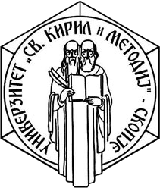IT Management (4+1)
IT Management (4 + 1)
1. General Information
Postgraduate studies in Management in Information Technology aim to provide quality and top European education and training of highly educated staff with in-depth knowledge of methods and techniques for managing ICT projects and systems. Upon completion of their studies, these staff will be able to take responsible positions in the processes of planning, design, management and monitoring of ICT projects and systems, including their business aspects.
The program in Management Studies in Information Technology is compatible with the relevant studies offered at most of the world's universities that support this topic and enable student mobility.
- Name of the proposer: University "Ss. Cyril and Methodius University in Skopje, Faculty of computer science and engineering - FCSE
- Study Program Name: IT Management
- Scientific-research area: 2 technical-technological
- Field
- The value of postgraduate studies is 60 ECTS credits .
- Duration of studies: 2 semesters .
- One academic year consists of two semesters lasting 30 weeks (1 semester = 15 weeks).
- Admission Requirements : Students in Information Technology Management can enroll in graduate students who have 240 or 180 undergraduate credits.
- Introductory layer : Students who have earned less than 240 credits during their studies are offered a variety of introductory courses. After their successful realization, the student acquires the right to continue with the first semester of postgraduate studies.
- First semester: 2 compulsory courses, 2 elective courses in the field.
- Second semester: 1 compulsory subject in the field, 1 elective subject in the field and 1 elective subject from the list of UKIM and final project - master's thesis (18 ECTS)
- 1 ECTS credit corresponds to 30 hours of total work engagement
- The number of contact hours is 4
Upon successful completion of the postgraduate studies in Information Technology Management, the successful student will possess the following general abilities and qualifications:
- Ability to work in interdisciplinary teams
- Power of analysis and synthesis
- Power to apply knowledge in practice
- Power to generate new ideas (creativity)
- Power of learning
- Ability to critique and self-critique
- Ability to make decisions
- Knowledge of English
- Research skills
Upon successful completion of the postgraduate studies in Information Technology Management, the successful student will possess the following specific abilities and qualifications:
|
Knowledge and Understanding
|
Provides in-depth knowledge and understanding of the theoretical foundations of software and innovation project management, information systems and risk management and other disciplines. |
|
Applying knowledge and Understanding
|
Can apply knowledge and understanding for professional development in a narrower area of Information Technology Management. |
|
Ability to evaluate |
Demonstrates a commitment to self-improvement and continuous professional development Demonstrates in-depth knowledge of advanced analysis and design techniques in the fields of Information Technology Management. Demonstrates knowledge of best practices for improving productivity and mutual understanding in business organizations taking into account personal, social, scientific and ethical aspects. Demonstrates the ability to make managerial decisions independently and link business practice with application solutions. |
|
Communication Skills |
Demonstrates the ability to communicate with colleagues and work in a team through a high level of awareness of the importance and power of communications. Illustrates effective exchange of information, ideas and reasoned arguments. Demonstrates high ability to work and lead multidisciplinary teams Demonstrates ability to plan and manage time at managerial level and professional socialization and conflict resolution. Recognizes complex organizational structures and the need to restructure them, understands their impact on effectiveness and efficiency in combination with modern technologies. |
|
Learning Skills |
Demonstrates an understanding of the basics of research methodology, with the ability to evaluate, design and conduct research in the field, formulate, plan a research project and communicate in depth on a topic. Demonstrates the ability to reasonably evaluate and generate ideas with creative and critical thinking, mastering new theories, models, techniques and technologies, while appreciating the need for continuous professional development. Able to select and understand procedures and methods for structuring, consolidating, and handling information and data in an environment. Has high self-confidence and independence, proactivity and self-awareness to perform and delegate tasks and manage further career. |
Acquired title: Master of Information Science and Computer Engineering in the field of Information Technology Management.
Table 1: Schedule of the courses in semesters and academic study years (AC)
|
List |
Course |
Course title |
Semester |
Weekly fund of classes |
ECTS |
|
|
L |
E |
|||||
|
FIRST YEAR |
||||||
|
1. |
IT-I-03 |
9 |
4 |
0 |
6 |
|
|
2. |
ITMWE02 |
9 |
2 |
1 |
6 |
|
|
3. |
ITMWE01 |
9 |
4 |
0 |
6 |
|
|
4. |
Elective course |
9 |
|
6 |
||
|
5. |
|
Elective course |
9 |
|
6 |
|
|
6. |
ITMSE01 |
10 |
2 |
0 |
6 |
|
|
7. |
|
Elective course |
10 |
|
6 |
|
|
8. |
|
Master's Thesis |
10 |
|
18 |
|
|
Total hours (lectures / exercises) and number of ECTS credits in the academic year |
|
60 |
||||
2.1 Electives
|
Number |
Code |
Name of the object |
Semester |
Weekly fund of classes |
ECTS |
Unit |
|
|
L |
E |
||||||
|
1 |
ITMWE07 |
9 |
2 |
2 |
6 |
FINKI |
|
|
2 |
ITMWE06 |
9 |
2 |
1 |
6 |
FINKI |
|
|
3 |
SI-Z-01 |
9 |
4 |
0 |
6 |
FINKI |
|
|
4 |
BK-I-12 |
9 |
4 |
0 |
6 |
FINKI |
|
|
5 |
ITMWE10 |
9 |
2 |
1 |
6 |
FINKI |
|
|
6 |
CC-I-02 |
9 |
2 |
2 |
6 |
FINKI |
|
|
7 |
ITMWE03 |
9 |
2 |
2 |
6 |
FINKI |
|
|
8 |
ITMWE08 |
9 |
3 |
1 |
6 |
FINKI |
|
|
9 |
ITMWE04 |
9 |
4 |
0 |
6 |
FINKI |
|
|
10 |
ITMWE11 |
9 |
2 |
2 |
6 |
FINKI |
|
|
11 |
IT-I-04 |
9 |
4 |
0 |
6 |
FINKI |
|
|
12 |
IT-I-10 |
9 |
4 |
0 |
6 |
FINKI |
|
|
13 |
EI-I-01 |
9 |
3 |
0 |
6 |
FINKI |
|
|
14 |
IS-I-07 |
9 |
4 |
0 |
6 |
FINKI |
|
|
15 |
KN-I-10 |
9 |
4 |
0 |
6 |
FINKI |
|
|
16 |
SDP-Z-4 |
9 |
4 |
0 |
6 |
FINKI |
|
|
17 |
IS-I-06 |
9 |
4 |
0 |
6 |
FINKI |
|
|
18 |
IT-I-18 |
9 |
4 |
0 |
6 |
FINKI |
|
|
19 |
SNP-Z-1 |
9 |
4 |
2 |
6 |
FINKI |
|
|
20 |
CC-I-04 |
9 |
4 |
0 |
6 |
FINKI |
|
|
21 |
IS-I-01 |
9 |
4 |
0 |
6 |
FINKI |
|
|
22 |
ITMWE09 |
9 |
2 |
0 |
6 |
FINKI |
|
|
23 |
SI-I-05 |
9 |
4 |
0 |
6 |
FINKI |
|
|
24 |
SI-I-07 |
10 |
4 |
0 |
6 |
FINKI |
|
|
25 |
SI-I-08 |
10 |
4 |
0 |
6 |
FINKI |
|
|
26 |
ITMSE02 |
10 |
2 |
0 |
6 |
FINKI |
|
|
27 |
CC-I-07 |
10 |
3 |
0 |
6 |
FINKI |
|
|
28 |
CI-I-11 |
10 |
4 |
0 |
6 |
FINKI |
|
|
29 |
SI-I-13 |
10 |
4 |
0 |
6 |
FINKI |
|
|
30 |
ITMSE05 |
10 |
2 |
0 |
6 |
FINKI |
|
|
31 |
EDU-I-10 |
Student Involvement in Humanitarian, Free and Open-Source Software Development |
10 |
2 |
2 |
6 |
FINKI |
|
32 |
ITMSE06 |
10 |
2 |
1 |
6 |
FINKI |
|
|
33 |
IT-I-08 |
10 |
4 |
0 |
6 |
FINKI |
|
|
34 |
EDU-Z-04 |
10 |
2 |
2 |
6 |
FINKI |
|
|
35 |
EDU-I-04 |
Recommender Systems, Virtual Guidance and Self- Help in Knowledge Mastery |
10 |
2 |
2 |
6 |
FINKI |
|
36 |
ITMSE07 |
10 |
2 |
1 |
6 |
FINKI |
|
|
37 |
SDP-I-4 |
10 |
2 |
2 |
6 |
FINKI |
|
|
38 |
SI-I-09 |
10 |
4 |
0 |
6 |
FINKI |
|
|
Total: |
|
|
|
|
|||


